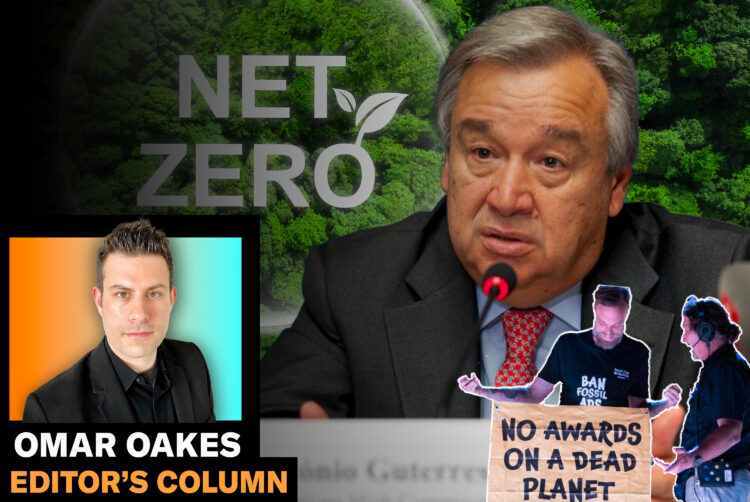Climate change and the politics of tantrums

Opinion: 100% Media 0% Nonsense
Banning media owners from running fossil-fuel ads is punitive. We need evidence-based decisions that will make our future more sustainable, not using this industry as an easy target, writes the editor.
Is there anything you care so passionately about that you would set yourself on fire over it?
Other than perhaps the welfare of your loved ones, is there anything in life so important to you that you could imagine yourself going through the grisly steps required to take your own life in such a shocking and painful manner?
Wynn Bruce, a 50-year-old climate activist from Colorado, was such a person. Two years ago, he stood outside the US supreme court and set himself on fire.
After his death, friends insisted Bruce did not “commit suicide”, but had committed a “fearless act of compassion to bring attention to the climate crisis… he had been planning it for at least one year”.
Fearless, yes. Compassionate, absolutely.
But how effective was it in bringing attention to the climate crisis? That’s where our media and advertising industry should know something about.
Because when it comes to climate change, we’re at the point when our sector risks doing the equivalent of setting itself on fire.
Throwing ads out with the bathwater
That’s fine, if it’s really worth it.
Last week, United Nations secretary-general António Guterres called for a worldwide ban on fossil-fuel advertising. Comparing fossil-fuel organisations to tobacco companies, Guterres urged the media to stop taking ads from the “godfathers of climate chaos“.
Some countries are already moving in this direction — ie. outlawing fossil-fuel ads on any media owned by public authorities, like outdoor posters. Amsterdam moved to ban fossil-fuel ads in 2020, as did France in August 2022 and 16 Australian councils, including Sydney.
In the UK, councils in Sheffield and Edinburgh have recently moved to curtail such ads, arguing that they are inconsistent with net-zero targets.
Sheffield even thought it necessary to ban airlines and airports from advertising on outdoor sites that it owns. Because ads for airlines might include content that “promote[s] more flying”. Sheffield City Council said it also wants to ban car advertising, even if its content promotes hybrid vehicles.
We, as an industry of private media and advertising companies, need to ask ourselves whether adopting such a ban is “the right thing to do”.
I Cannes hear the protests already…
This question will be asked directly to us next week at Cannes Lions, the world’s biggest ad industry awards.
As the circus rolls into the Riviera once again, climate protests have become a regular part of the Cannes experience, ready to greet you after a frenzied budget airline journey and to accompany a glass of extortionate beach-temperature rosé.
Because there’s little doubt that, as a society, we’ve really fucked it up. We are spectacularly failing to reach net-zero targets for 2030; we can’t even get our act together to build more renewable energy sources, let alone take the painful steps necessary to reduce consumption of energy in the first place.
But there’s something I like to tell my three-year-old when she believes she’s made a catastrophic mistake, such as getting her favourite dress too dirty to wear in public: “Being angry and having a tantrum won’t make things any better. We can’t change what has happened in the past.”
(Which doesn’t really help the situation but, let’s be honest, if you can’t indulge yourself in some know-it-all behaviour with children, you’re just not having enough fun as a parent!)
Let’s be clear, banning fossil-fuel ads is society having a tantrum. While that anger is justified, will it actually work?
Wrong direction of travel
Instead of coming up with a solution that helps to reduce greenhouse-gas emissions, the motivation behind this move is punitive.
Political leaders want to punish Big Oil for making vast profits for decades at the expense of the only home we’ll ever have.
Where’s the evidence that such a move would lower consumption of any products and services that rely on using non-renewable energy? Energy is already a highly regulated sector, precisely because it’s a utility — or an “inelastic good”, as economists say.
On the subject of Cannes and international travel, would a ban on airline advertising by Edinburgh Council have any impact? For every handful of Scottish households that may forget to book a holiday abroad because they haven’t seen an easyJet ad, what does it do to stop business travellers and wealthy people whose carbon consumption for travel far outweighs that of middle-income households?
Would a simple policy of banning air miles be more effective?
Scope3 found that transport is responsible for 29% of greenhouse-gas emissions in the US and business travel accounts for a fifth of domestic travel. According to Reuters: “Flights account for about 90% of business-travel emissions. That makes it the lowest-hanging fruit for companies setting reductions targets.”
Getting real about consumption
Advertising by energy companies is already highly regulated.
In the UK last summer, the Advertising Standards Authority banned ads by fossil-fuel companies for misleading claims over how clean their overall energy production is. In response, Shell said that people who saw the ads would already be well-informed of its operations and would mainly associate the brand with petrol sales.
That is, as the kids say: “No shit, Sherlock!”
No-one chooses to visit a Shell petrol station because they’re comforted by an ad that explains how it’s investing paltry amounts into creating wind turbines and hydroelectric plants.
They do it because “it’s the nearest petrol station on the way home from work”. And “yes, I could take the train, but I have to pick up my kids”. And “it would add an hour to my daily commute if I use public transport”. And “by the way, the car is really useful for trips at the weekend and sometimes it’s a life-saver for helping my elderly mother, who can’t get around so well”. And… and…
The economic reality is that energy is already expensive.
But we can’t decide if it’s an entitlement or a luxury. We talk about “fuel poverty” during the winter when some people have to choose between “eating and heating”, but then we want to treat energy like it’s a naughty habit, like smoking cigarettes or pornography.
The choice we face
When are politicians going to get their act together and truly lead when it comes to energy policy?
Why should it be up to the media to set itself on fire and turn down fossil-fuel advertising when a retailer like Sainsbury’s is allowed to have a petrol station next to one of its large supermarkets, or airports and shopping centres are praised for offering charging points for all these smartphones and tablets that are always running out of battery?
As ever, media is the easy target and expected to hold itself to a higher standard.
People like Wynn Bruce held himself to such a high standard that he was willing to end his life to help bring about a better future. Whether you think he was deluded or inspirational, setting himself on fire was his choice.
If media owners want to ban fossil-fuel ads, as many have done, that’s their choice too.
But a ban for the whole industry?
Being angry and having a tantrum won’t make things any better. We can’t change what has happened in the past.
 Omar Oakes is editor-in-chief of The Media Leader.
Omar Oakes is editor-in-chief of The Media Leader.
100% Media 0% Nonsense is a weekly column about the state of media and advertising.



